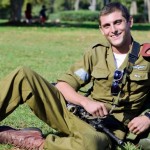Interview with Mashy Raul September 18 2013
Mention the phrase "religious tolerance" to many Jerusalemites and you're sure to spark a lively discussion, to put it mildly. With upcoming local municipality elections in Jerusalem, the competing parties can always count on the powder-keg issues of co-existence and demographic changes to drag the demons out of the closet on both sides.
Many secular residents bemoan the "escape" of young professionals to Tel Aviv, complemented by the growing ultra-Orthodox presence in historically secular neighborhoods, leading to growing friction between those who would enforce the perception of Jerusalem as a religious holy city and those who aspire for Israel's capital to become a beacon of secular culture and progress.
Mashy Raul, 19, is unfazed by all this. A pants-wearing, modern-Orthodox 19 year old who hails from Flatbush Avenue, Brooklyn, is beginning her service in the co-ed Karakal combat unit, and doesn't see what all the fuss is about. In fact she feels more comfortable in Jerusalem than back in New York. Mashy fell in love with Nahlaot, where she feels she can be herself, walking through the streets wearing whatever she wants without people judging her.
"I grew up in a pretty laid back modern-Orthodox family, but feeling that the Orthodox community judged me for not conforming to their standards of modesty. I almost felt they thought I was a shiksa for wearing pants."
"I love New York. I played point guard in basketball since 9th grade so many of my friends on-court were non-Jewish and I hung out in a mixed crowd. My favorite spot was the village at St Marks. Off-court, many of my good Jewish friends were from my participation in the NCSY youth movement. We would hang out – guys and girls – and have a good time. The counselors are all modern-Orthodox, but not all of the kids were observant".
Despite her education at Shulamit – a Zionist high school, the thought of moving to Israel hadn't occured to her during her childhood, which made her decision to join the IDF something of a surprise – both to her family and to herself.
"I first came to Israel at the age of 12 with my family, but it didn't make a big impression on me. I went to the kotel and I thought, "OK, so its'a wall". But then I did a course in college called History of Zionism a year before coming on Birthright, and I felt that I learned a lot about Israeli culture beyond the stereotypes. I would see street signs and I would recognize the names from my course. In Israel, everwhere you go you're walking on Jewish history.
"There was a stage that I was debating to join the American Marines, but then I realized that while my home is in America, my heart is in Israel. I was a good student and was accepted to pre-med school. I finished my first year, but after my experience on Birthright I felt a need to contribute to this country. So I decided to enlist in the IDF, which also seemed a better option because I can observe my religion and I don't have to commit to 4 years.
My grandfather was a Marine during the war in Vietnam, as we all know it wasn't pretty, so he's against me serving in the army. When he heard I was joining I thought he was going to cry, he kept saying "You don't understand, you can't do that, I had friends who died in the army…" so I assured him "Don't worry, I'm just going to be a mechanic…
"I told my parents the same story – to this day they don't know I'm serving in a combat unit and I don't want to worry them. They were willing to support me financially, but I don't feel comfortable asking them for money when they don't agree with my choice".
Mashy spoke to some friends who had joined the IDF as lone soldiers and they referred her to the Lone Soldier Center in Memory of Michael Levin. She called them up from America and was surprised to be answered by a volunteer speaking perfect English with an American accent, and she felt comfortable seeking advice about her plans.
"I came to Israel and moved in with my lone soldier friends in Nahlaot, and then I met Tziki (Founder of the Lone Soldier Center) who helped me to enlist in Mehinat Tavor, a 2-week preparation course where we travelled the country and did some pre-army training. There were people from all over the world, and they spoke to us in Hebrew".
Two months ago, Mashy began basic training for Karakal as part of the Machal program and moved to Carmiyya, a Kibbutz south of Ashkelon. From the gleam in her eyes describing her training you can see she's one happy camper.
"It's kind of hard, but it's a lot of fun. I've never held a gun before so at first I was a bit of a "shockistit" (Astronaut?!) I was like 'What do I do? What do I do?' but after a while I adjusted. My commander is really great. He pretends not to understand English, but I know he does. I have other lone soldiers in my unit, and we all support each other. We get to speak on the phone for only 40 minute a night, so it's hard to keep in touch with everyone back home, but it's all part of the experience".
"A strange challenge for me in the army is that you can't have any manners. I really want to say thank you to my commanders and I'm not allowed to – they do a lot for me but apparently I'm supposed to expect it and not show appreciation! But I guess the biggest challenge is the language barrier. Anything I say comes out with this big American accent and I carry around a Hebrew dictionary with me all the time.
"Probably the worst thing that happened to me during my army service – we were getting out of base for Rosh Hashana and my wallet was stolen, so I had to borrow 100 shekels from my commander. Then I get home and the fridge was broken, so it was a couple of hours before Rosh Hashana and I had no food and I was freaking out. So I called up the Lone Soldier Center crying, and within a few minutes they sorted me out with meals."
For a 19-year old girl brought up in a nice Jewish family, it seems that Mashy is adapting to independent life like a fish to water. Despite her initial reluctance to tell her story (she claims that there is nothing unusual about her decision), it would seem that many immigrants would be inspired by her upbeat attitude as she tackles each new challenge that arises.
"If there's any advice I can give new immigrants, it's that you've got to be motivated, you've got to know it's going tp work out for you but you have to work hard to make that happen. Be open-minded to the native Israelis, and try to see the humorous side even in difficult situations."
After her stint in the army, Mashy plans to finish medical school in New York and then return to Israel to specialize in pediatric medicine.



